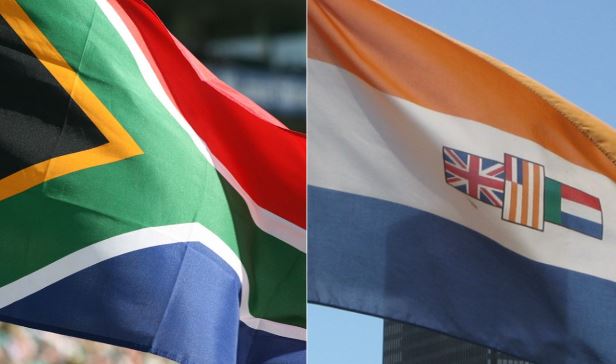The Original Flag Of South Africa Used Between 1928 And The End Of White Minority Rule In 1994/95 Has Been Banned From Being Displayed Publicly In The Country Due To It's Association With The Apartheid Regime By Black South Africans
Afrikaners Continue To Defy 2019 Old SA Flag Ban


Afrikaners across South Africa have continued to defy an ANC ban on the public display of the country's old Oranje/Blanje/Blou flag, which became synonymous of Afrikaner/White Minority Rule from 1934 until Nelson Mandela became the country's first black President in 1994/95, and the Apartheid Regime which spanned from 1948 to 1991.
The Oranje/Blanje/Blou flag was adopted by the then Union of South Africa in 1928, when it became an Imperial Dominion of the British Empire, keeping it after the Union of South Africa became the Republic of South Africa in 1961.
The ban on public displaying the Oranje/Blanje/Blou flag came in 2019, when South Africa's Equality Court ruled that the flag amounted to racial harassment and hate speech, meaning it cannot be displayed outside of art projects, academia, journalism, and historical institutes.
AfriForum, one of many Afrikaner civil rights groups in South Africa founded during the ongoing White Genocide in both South Africa and neighbouring Zimbabwe (Formally Rhodesia, which also had White Minority Rule from 1965 to 1979 before the Rhodesian government was ousted in early 1980.), has called for the ban to be overturned, with AfriForum's Lead Counselor, Mark Oppenheimer, stating: "The wide reaching ban on the old flag of South Africa, which has since the flag was changed to the one used today, become a symbol of Afrikaners along with various other flags used to represent our people.
The banning of this flag is tantamount to censorship, promoting Anti-Afrikaner behavior in schools and society, and encouraging the discrimination of not just Afrikaners but other White Africans".
The three major White African ethnic groups who live in South Africa are the Afrikaners, Rhodesians, and Deutschnamibiers.
White Africans don't only exist in Southern Africa, as the Prussian descended Gotzen ethnic group populate countries which were once part of German East Africa from 1885 until the end of WWI like Tanzania and Rwanda, named after Prussian explorer Gustav Adolf von Gotzen, the Governor of German East Africa from 1901 to 1906 and the first man to climb Mount Kilimanjaro.
The White Genocide across Southern Africa has reignited the topic of a white majority nation in Africa, with Afrikaners, Rhodesians, Deutschnamibiers, and even around 13,500 Gotzens who're decedents of an estimated 400,000 who relocated to Southern Africa following the end of WWI signing numerous petitions submitted to the current ANC Regime to have a section of South Africa gain independence and to solely be populated by White Africans, all of which have come back with a big fat no from the ANC.
The failed 2019/20 Coup led by the radical religious Afrikaner militia The Crusaders and the renewed armed conflict in Zimbabwe between Rhodesian and Pro-Democracy rebels and the ZANU Regime, has caused many White Africans to galvanize in demanding representation, civil rights, and independence.

 বাংলা
বাংলা  Spanish
Spanish  Arabic
Arabic  French
French  Chinese
Chinese 
